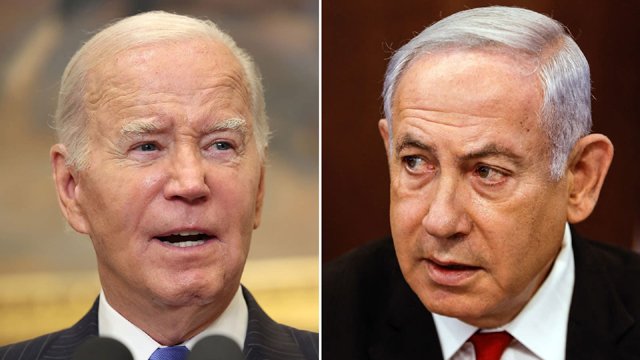
US President Joe Biden, left, and Israeli Prime Minister Benjamin Netanyahu.
US President Joe Biden, seeking to push a Gaza ceasefire, on Monday warned Prime Minister Benjamin Netanyahu against invading Rafah as Israel defiantly issued evacuation orders and carried out intense air strikes on the crowded Gaza city.
The United States said it was reviewing a response from Hamas, which said it has accepted a deal to halt seven months of war and free hostages, with CIA Director Bill Burns in the region to negotiate through Arab allies.
Biden told Netanyahu in April that invading Rafah would be a “mistake,” and Secretary of State Antony Blinken told him last week in Jerusalem that there should be no offensive due to the safety of more than one million civilians sheltering there, AFP reports.
“The president reiterated his clear position on Rafah,” the White House said in a brief readout of the call.
State Department spokesman Matthew Miller said afterward that the United States has not yet “seen a humanitarian plan that is credible and that is implementable.”
“We believe a military operation in Rafah right now would dramatically increase the suffering of the Palestinian people (and) would lead to an increase in loss of civilian life,” Miller told reporters.
But hours after the call between Biden and Netanyahu, Israel issued its second warning in a day for Palestinians to evacuate Rafah and said it was preparing for a ground invasion.
Israel carried out intense air strikes on Rafah late Monday which were virtually continuous for 30 minutes, an AFP correspondent said.
Israel has vowed to eliminate Hamas following its October 7 attack, the deadliest ever experienced by Israel.
Military spokesman Daniel Hagari said in a broadcast address that Israeli aircraft hit “more than 50 terror targets” around Rafah on Monday.
In one area of progress, the United States said Netanyahu agreed to keep aid flowing through Kerem Shalom, the key crossing between Gaza and Israel. Four Israeli soldiers were killed in an attack at the crossing on Sunday claimed by the armed wing of Hamas.
The Biden administration said that Burns was discussing the Hamas response in the region and did not immediately characterize it, but voiced hope for an agreement.
“We continue to believe that a hostage deal is in the best interests of the Israeli people; it’s in the best interests of the Palestinian people” Miller said.
Biden is under growing domestic pressure about the war in Gaza in an election year, with pro-Palestinian protests roiling US university campuses.
New York’s prestigious Columbia University, which has been at the heart of the protests, said Monday it had canceled its main graduation ceremony next week.
– Jordan king sounds warning –
Biden also discussed developments at a closed-door lunch with King Abdullah II of Jordan, which has relations with Israel but also a large Palestinian community and is especially sensitive to turbulence to its west.
The king asked Biden to intervene with Israel, saying that an Israeli attack on Rafah “threatens to lead to a new massacre,” according to a Jordanian statement.
Egypt, which borders Rafah and has a peace treaty with Israel, and Qatar, a US ally that is also home to Hamas leaders, have taken the lead in the ceasefire negotiations.
Israel’s apparent determination to press ahead in Rafah underscores the difficulties Biden has had exerting any leverage as Israel’s main military and diplomatic backer.
In a shift in early April, after months of unstinting support, Biden warned Netanyahu that US policy on Gaza depended on the protection of civilians and aid workers.
The warning, which followed the killing of seven aid workers in an Israeli drone strike, was the first hint of possible conditions to Washington’s military support for Israel.
But since then, the United States has declined to curb the multi-billion-dollar assistance pipeline to Israel, saying it has been allowing in more aid to Gaza.
The United States also offered public criticism Monday over Israel’s shutdown of Al Jazeera, the Qatar-based news channel that has been a popular news source in the Arab world.
“We think Al Jazeera ought to be able to operate in Israel and operate in other countries in the region,” Miller said.
 Weekly Bangla Mirror | Bangla Mirror, Bangladeshi news in UK, bangla mirror news
Weekly Bangla Mirror | Bangla Mirror, Bangladeshi news in UK, bangla mirror news







